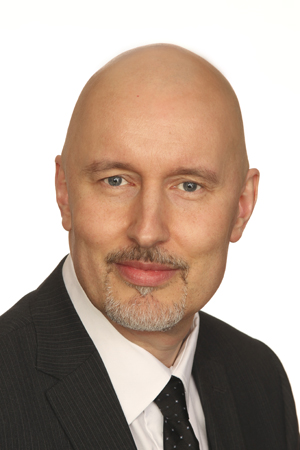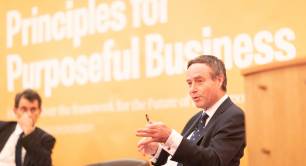Opinion: What can A Christmas Carol teach us about social entrepreneurship?
Dan Overall of the Trico Charitable Foundation finds important messages for the impact community in Charles Dickens’ famous seasonal ghost story, published on this day 180 years ago.
 While the three ghosts of Christmas Past, Present and Future deservedly receive the lion’s share of public attention, Scrooge in A Christmas Carol by Charles Dickens was haunted by four ghosts. The fourth is actually the first to appear in the story, his departed partner Jacob Marley.
While the three ghosts of Christmas Past, Present and Future deservedly receive the lion’s share of public attention, Scrooge in A Christmas Carol by Charles Dickens was haunted by four ghosts. The fourth is actually the first to appear in the story, his departed partner Jacob Marley.
Marley’s principal task in the narrative is to set up the coming of the other three, but he is no mere gateway ghost. His scene includes an exchange that should cause anyone interested in social entrepreneurship to prick up their ears.
Hearing Marley is condemned to an eternity of wandering the world as a spirit, dragging yards upon yards of chains, Scrooge tries to console his former partner by saying Marley had always been a good businessman.
Marley’s response is this. “Business!” cried the ghost, wringing its hands again. “Mankind was my business. The common welfare was my business; charity, mercy, forbearance, and benevolence were, all, my business. The dealings of my trade were but a drop of water in the comprehensive ocean of my business!”
That Dickens captured the essence of social entrepreneurship, in 1843 no less, is remarkable
That Dickens captured the essence of social entrepreneurship, in 1843 no less, is remarkable. But if we dig a little deeper we can see Dickens does something quite clever, something that may give us a major insight to help guide our present-day efforts to advance social entrepreneurship.
- Explore Dickens’ lessons for purpose-driven leaders in: Why every business needs a maniac and a minder
How do we define ‘business’?
If asked to define “business”, most people will say something along the lines of a “commercial activity engaged in as a means of livelihood”. And that is indeed how Scrooge uses the word when he tries to comfort Marley. But Marley uses “business” in another sense, the sense of “business” being what we care about.
The way Marley uses the word is fairly common. It’s in everyday expressions such as “mind your own business” or “that’s none of your business”, but strangely we tend to forget it when we think about business. It’s a reminder of the extent to which the insidious creep of profit-maximisation has gripped the throat of our culture.
We also do this for the word “profit”. Asked to define “profit”, most people will say something along the lines of “surplus revenue over expenses”. But “profit” can also mean benefit, such as: “What does it profit a man to gain the world if he loses his soul in the process?”
Dickens’ rhetorical sleight of hand doesn’t have to serve only as a reminder of what we have lost, it can remind us of what we still have: choice. Ironically, this moment with Marley is a microcosm of the major theme in the novel – the power of choice.
Now, of course, there is an upside and a downside to freedom of choice. The upside is you can do what you want (within the bounds of law). The downside is others can do what they want (within the bounds of law).
Visionary that he was, Dickens seems to have anticipated exactly this dilemma in what are almost the last lines in A Christmas Carol: “Some people laughed to see the alteration in him, but he let them laugh, and little heeded them; for he was wise enough to know that nothing ever happened on this globe, for good, at which some people did not have their fill of laughter in the outset; and knowing that such as these would be blind anyway, he thought it quite as well that they should wrinkle up their eyes in grins, as have the malady in less attractive forms. His own heart laughed: and that was quite enough for him.”
Lest there was any doubt in what he was saying, Dickens’ last words in the story are: “And so, as Tiny Tim observed, God bless us, every one!”
Note that he doesn’t just say “God bless us”, where we could have wondered if the characters were talking about themselves or everybody, he adds the “every one” to be absolutely clear.
‘With charity towards all…’
We would do well to pause to take in the extraordinary magnanimity of what Dickens is saying – even though some are blind to what we are trying to do and even laugh at us, we are to extend them kindness, we are to wish them well. One is reminded of US president Abraham Lincoln’s second inaugural address in which he says: “With charity towards all and malice towards none”. These words were uttered just 22 years after A Christmas Carol was published.
In A Christmas Carol, Dickens gives us the ultimate of gifts, the gift of choice. We can choose to see “business” as merely a matter of trade, or the vehicle to serve the common welfare, charity, mercy, forbearance and benevolence.
Equally importantly, we can focus on inspiring and empowering those who see the potential of business to serve society, or we can focus on fixing or overthrowing those who are blind to these possibilities. I fear the latter will only lead to further divisions, polarisation and an eventual culture war.
The choice is ours.
Dan Overall is executive director of the Trico Charitable Foundation, a Canadian-based organisation which supports social entrepreneurship.
Header image of Scrooge and the Ghost of Marley by Arthur Rackham via Wikimedia Commons
Thanks for reading our stories. As an entrepreneur or investor yourself, you'll know that producing quality work doesn't come free. We rely on our subscribers to sustain our journalism – so if you think it's worth having an independent, specialist media platform that covers social enterprise stories, please consider subscribing. You'll also be buying social: Pioneers Post is a social enterprise itself, reinvesting all our profits into helping you do good business, better.



